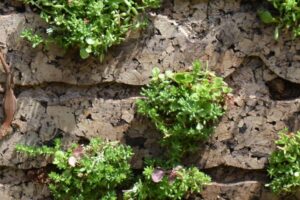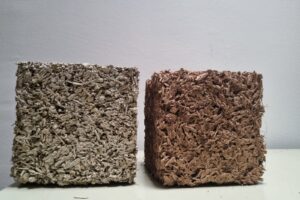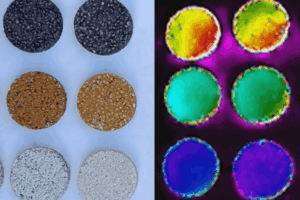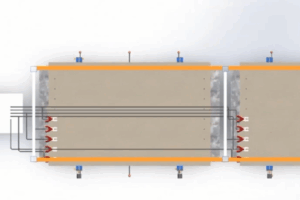
New high-value materials based on recycled PET
February 11, 2022
An APP to assist with the differential diagnosis of patients with Parkinson’s disease and essential tremor
February 15, 2022Researchers in the Analysis and Technology of Structures and Materials (ATEM), the Geomatic Engineering (EGEO) and Construction Engineering (EC) groups, led by Rolando Chacón from the UPC Department of Civil and Environmental Engineering, are taking part in ASHVIN. The aim of this project is to provide a digital platform that will be completely ready to set up digital twins. It will be interoperable with a wide range of designs and engineering applications in the construction sector. At the same time, through the integration of IoT with a wide range of sensors (including photogrammetric sensors), efficient synchronization will be achieved between physical and virtual models, with a set of tools that will help in decision making.
The aim of this digital twin is to significantly improve productivity in the European construction industry, which has increased only 1% annually in the last two decades, and to reduce associated costs. It is expected that by 2025, large-scale digitalization will lead to overall annual cost savings of from 13% to 21% in the design, engineering and construction phases, and from 10% to 17% during the operations phase. In a sector like construction, which is currently by far the most dangerous occupation with a very high rate of fatalities in comparison with other industries, this new platform would enable digitalization of flows that indicate the evolution of the safety of work conditions, and ensure employees’ privacy rights.
Ten pilot tests will be carried out in real projects in different areas of construction and different places in Europe, including Spain, Poland, Germany, Croatia, Sweden and the Netherlands.
ASHVIN has aligned its objectives with the European Green Deal, the most ambitious package of measures that should enable European citizens and companies to benefit from a sustainable green transition to become the first climate-neutral continent in the world in 2050. The project is part of Horizon 2020. It started in 2020 and will last 3 years. The total budget is €5,609,858.75.
Finally, the role of UPC researchers is to coordinate the work package associated with the maintenance of infrastructure based on Digital Twin technology. The idea is to integrate Structural Health Monitoring, simulation, risk analysis and decision making in a combined application in the form of a virtual environment. In addition, professor Rolando Chacón is leading tasks relating to three of the project case studies (bridges and buildings in Extremadura and Barcelona).

Viaduct of Valdelinares. AVE. Plasencia-Cáceres.
Office building in Barcelona. Scan-to-BIM techniques
Sector
Topic
You want to know more?
Related Projects
SATE-VEG: A system for energy renovation of buildings that helps reduce the urban heat island effect
Researchers from the Architecture, Energy and Environment (AiEM) group at the Universitat Politècnica de Catalunya - BarcelonaTech (UPC) have developed SATE-VEG, an external thermal insulation system with a vegetal coating that offers seasonally adaptive thermal behaviour, enhances urban biodiversity and promotes positive health effects. The system is made from organic materials, requires low maintenance and consumes minimal water.- A research team from the Interdisciplinary Group on Building Science and Technology (GICITED) at the Universitat Politècnica de Catalunya – BarcelonaTech (UPC) is leading the BioSAFE project, which aims to develop sustainable building envelopes —mainly façades— designed according to sustainability, comfort and safety criteria, with particular attention to their acoustic behaviour and fire performance.
- The Construction Materials and Roads (MATCAR) research group at the Universitat Politècnica de Catalunya - BarcelonaTech (UPC) has carried out the RELUM project with the aim of researching and developing innovative solutions to help prevent global warming, through the design of sustainable pavements with reflective and photoluminescent properties, in collaboration with the company Sorigué.
- The Structural and Materials Technology (ATEM) research group at the Universitat Politècnica de Catalunya - BarcelonaTech (UPC) is participating, in collaboration with the Universitat de les Illes Balears (UIB), in the ReINfoRCed project, which aims to promote the extension of the service life of reinforced concrete structures affected by corrosion.






